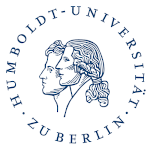Q&A with Former Interns
The internship program is a great way to learn about research topics in quantum field theory and theoretical physics, to get a feel for what a research career is like, and to establish a professional network outside one’s home university. A few of our former interns, Maite Carli and Jilly Kevo, have kindly shared their internship experiences at the RTG. Maite was a second-year master student at U. Bonn when she came to do an internship with Prof. Gaetan Borot in summer 2023, and Jilly had just completed her bachelor’s at U. Luxembourg at the time of her internship with Prof. Olaf Hohm, also in summer 2023.
Q&A with Maite Carli
Q. What was your internship project about?
A. In Liouville conformal theory, there are deep connections between probability theory, via Gaussian multiplicative chaos, and algebra, specifically the representations of the Virasoro algebra. My project was about constructing fractional and logarithmic powers of the Gaussian free field to then investigate to which algebraic structures these powers give rise. We started by analyzing the toy model, that is, Brownian motion.
Q. Why did you apply to do an internship at the RTG?
A. I had already wanted to do some internship in mathematical research for a few semesters before I applied to the RTG, mainly because I wanted more data on which I could base my decision whether or not to continue towards a PhD. Mathematically, my interests were always evenly spread between algebra, geometry and probability theory and I was interested in physics. An internship at the RTG was the perfect opportunity to combine all of this.
Q. What was your favourite memory during your internship?
A. It is hard to pick one specific memory. There were so many nice moments both on the academic level, but also just about living in Berlin, which I found to be a very enjoyable city with plenty to offer. The RTG retreat is definitely one of the best memories. It was very interesting to get some insight into all the different questions physicists are working on, from very mathematical things like topological string theory to more down to earth topics related to phenomenology or quantum computing. It showed me how broad science is and it was a refreshing change from standard lectures that are often focused on specific details.
Q. What do you think is the best part about the internship program?
A. To me personally, the best part were all the people I was lucky enough to meet. I found it very enriching to exchange with scientists at all stages of their academic career, PhD students who just started a few weeks ago, those midway, those who just defended their thesis, post-docs, professors, other interns. More generally, I enjoyed getting to have a glimpse behind the scenes of academia, seeing what daily research actually looks like.
Q&A with Jilly Kevo
Q. What was your internship project about?
A. Roughly speaking, my project revolved around the mathematical foundations of a new (albeit still partial) reformulation of quantum mechanics. Up to now, the theory, called (co)homological quantum mechanics, provides a novel way to compute normalized quantum expectation values by purely algebraic techniques (relying in particular on Batalin-Vilkovisky (BV) algebras), and that without involving path integrals or any of the formalism stemming from the canonical protocol.
My endeavour was to investigate how and under which form this new quantum theory encodes the concept of geometric quantization. Through a detour to the realm of cyclic L-infinity algebras, I was led to consider the BV-BFV formalism, which, unlike BV, takes particular care of the information that resides on the boundary. Considering that homological quantum mechanics lives on closed intervals, this proved to be very useful.
Q. Would you like to keep working on your internship project after leaving Berlin?
A. Even after spending weeks combing the literature in pursuit of the ultimate mathematical master key that unlocks all of homological quantum mechanics well-hidden secrets, the project is naturally still far from being complete. The theory being very reticent, there still remain a lot of unexplored directions to pursue with the final goal of a complete reformulation lurking somewhere in the distance. Having just completed my bachelor’s at the time of the internship, my mathematical toolbox was naturally not sufficient to crack the problem completely and I hope that, throughout the course of my studies (e.g. with the aid of the master’s in Bonn), I will acquire a variety of techniques that will lead me to new horizons.
Q. What have you learned during your internship?
A. Besides the considerable amount of arcane mathematical and physical concepts I was allowed to play with, I think that the most valuable lesson I received was the first-hand experience of conducting independent research. Figuring out which problems to tackle first and which to postpone for later while trying not to drown in a seemingly infinite sea of questions was probably most valuable to me. Eventually things start to crystallize and one begins to understand where the primary focus should be, so that, once having found the right questions, the boundless sea is suddenly converging and one is no longer drowning — or at least not as submerged.
Q. What do you think is the best part about the internship program?
A. The program generously gifts an experience that is only rarely (if ever) obtained during a standard university curriculum even though it is, at least in my opinion, of great value if one would like to pursue research. Berlin provided me with an environment that fostered my creativity in the sense that it gave me the stage I needed to test (and share) all kinds of ideas without the fear of earning a bad grade when hitting a dead end or the limitations of time constraints. I am very grateful for having been a part of this.

